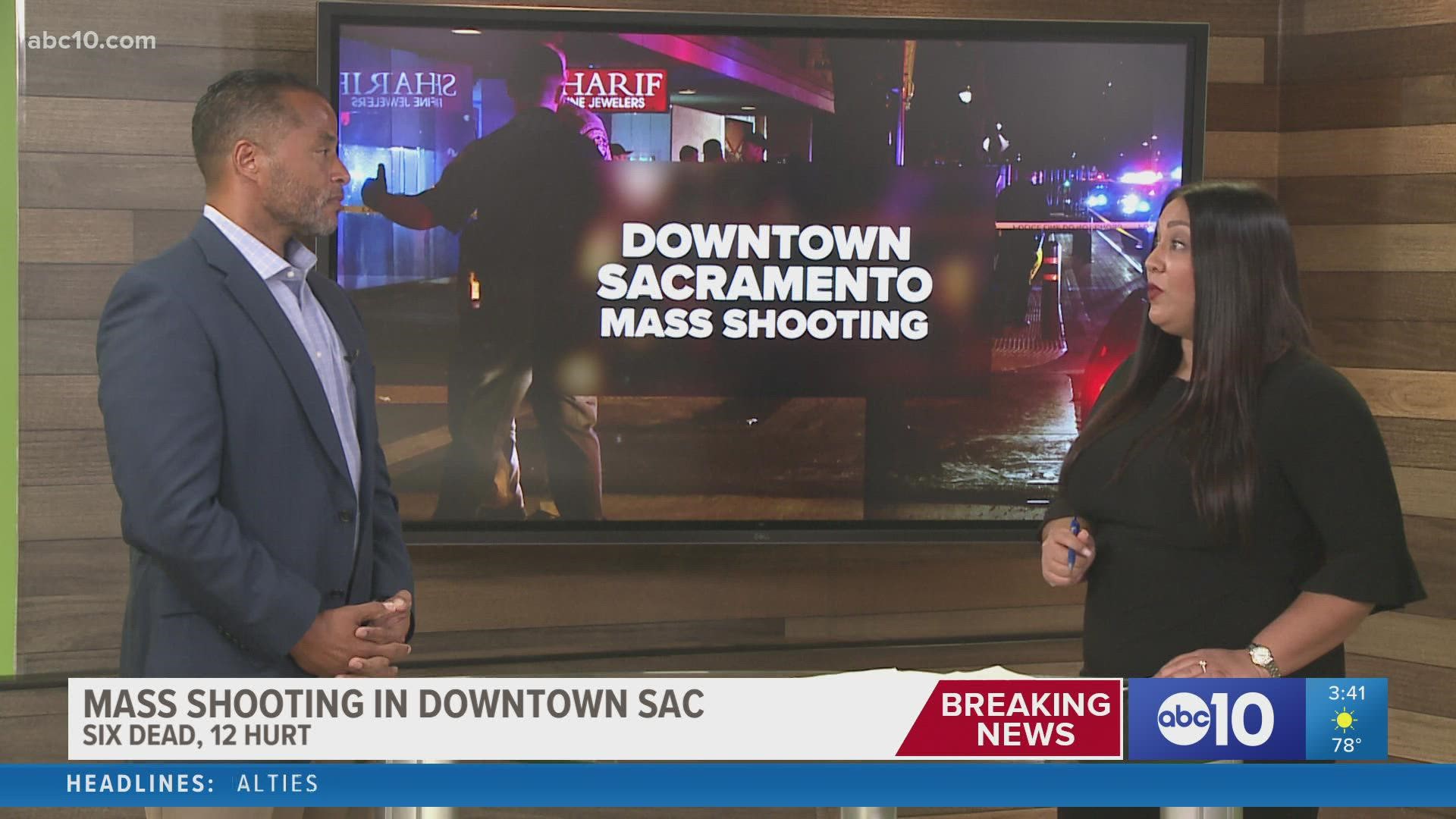SACRAMENTO, Calif. — At least two shooters are on the run after a mass shooting left six people dead and 12 hurt early Sunday, said Sacramento Police Chief Kathy Lester.
Three of the victims were identified as men and the other three as women.
The shots were fired before dawn Sunday morning as people left bars and nightclubs. A video posted to Twitter showed people running through the street amid the sounds of rapid gunfire.
Officials said at least four of the wounded suffered life-threatening gunshot injuries. Sunday’s violence was the third time in the U.S. this year that at least six people have been killed in a mass shooting, according to a database compiled by The Associated Press, USA Today and Northeastern University.
For Sacramento, It was the second mass shooting in five weeks.
Former Sacramento Police Chief Daniel Hahn spoke with ABC10 about the tragedy to provide some perspective on what happened.
The following remarks have been edited for brevity.
What is your reaction to the video of mass shooting making rounds on social media?
"Being from Sacramento and living here, It hits, really, home when you see that in your own city. But we see this every day in some cities across our country, the violence, the gun violence, all sorts of violence. It just shows that there's something lacking in our society that needs to be addressed that people are more than willing to settle their differences with violence."
Is it alarming to see these multiple fatal shootings in Sacramento?
"Well, all in one incident is very unusual, thankfully. But you know, every year we lose more than six people throughout a period of time in the different neighborhoods, in certain neighborhoods, in our community and it does not get the attention that something like this is getting. But all in one incident, having six people murdered and (12) other people shot is very unusual."
What did you mean when you said solutions lie in addressing root causes of violence?
"Even for the last couple years and throughout history, we've had this debate. So in the last couple years, we've debated, do we increase law enforcement or do we eliminate law enforcement? And those are the extremes that aren't the answer. So for example, here in Sacramento downtown, you'll see, I'm sure, an increased law enforcement presence in the downtown core in the coming days. Those officers come from somewhere else, so you're taking an officer out of another critical duty... - that's not sustainable. So it has to be addressed: why are people willing to do this - the poverty, the lack of education in certain communities, and the lack of hope among certain communities that make it OK to be violent like this."
How does an investigation start when so many people are hurt?
"Well, you see the frustration on behalf of families trying to get information of whether their loved ones were part of this. I too lost my younger brother to gun violence in this community, and I was the one that had to call my mom and tell her and listen to her cry about her youngest son being killed. So I understand that. At the same time, there's officers... that heard these gunshots, so they're responding to the scene trying to address the violence that's going on at that time, trying to ensure that the gunshots aren't going off anymore. At the same time, they're observing people, obviously, that were injured and hundreds of people running probably in all directions in a very chaotic scene. At the same time, eventually they have to transition into preserving evidence, getting witness statements, all the markers you see on the ground, ensuring that that's not disturbed, secure the scene. So it's a very chaotic scene coordinating with fire, ambulance crews, the hospitals to get people aid (and) at the same time, having the ability to hold the people that are responsible for this accountable in their day in court."
How has social media handle the way you handle your investigations now?
"It's like most everything. It's good and bad, so it's increased the ability to get information out really quick but it's also accessible to everybody, so a lot of misinformation gets out really quick that can cause challenges for any investigation, or even people hearing something about their loved ones that either isn't true or that's not the way you want to tell somebody about where their loved one is. It's both good and bad."
What do you say to people who might have information that can help with the investigation?
"That is a legit challenge, and people are fearful and rightfully so. They can always call Crime Alert and truly remain anonymous. A lot of times people have relationships with people in the police department or other community groups; they can remain anonymous and call. The important thing is to get the information, whatever information they might have, as insignificant as they might think it is, it might be the last piece that helps the police officers and the detective solve the crime. I would say you can remain anonymous, truly anonymous, but getting that information to the appropriate people is important."
WATCH ALSO:



















